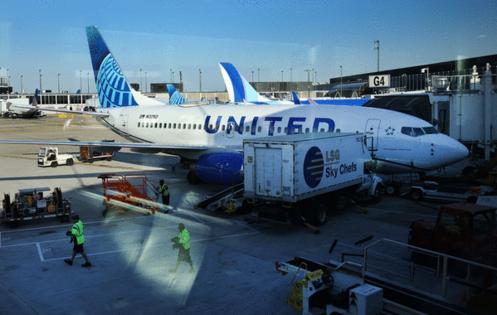United Airlines gets additional gates at O'Hare, while American loses a few: 'Competition keeps fares lower'
Published in Business News
Beginning Wednesday, United Airlines will operate out of five additional gates at Chicago O’Hare International Airport. American Airlines will lose four.
The shift in gates is the result of a “use it or lose it” provision in a lease agreement the airlines signed with the city in 2018. Under the agreement, gates at the airport are reallocated based on an airline’s flying frequency the previous year.
For weeks, the airlines have been engaged in a legal tug-of-war over the gates, with American filing suit against its rival airline and the city of Chicago, alleging that the reallocation process was initiated too early. But last week, a Cook County judge sided with the city, and the gate reshuffling is moving forward.
Air travelers likely won’t notice the gate shuffle, experts said. But the turf war speaks to the fierce competition for gate space at O’Hare, which is in the unusual position of serving as a dual hub for two major airlines.
Experts say that competition between United, the largest carrier at O’Hare, and American, the second-largest, is ultimately good for travelers.
“Competition keeps fares lower, that’s the bottom line,” said airline expert Brett Snyder, president of the industry website Cranky Flier.
The city maintains that the gate reallocation is designed to promote healthy competition.
“It incentivizes airlines to optimize their use of gates at O’Hare. This results in more flight options for passengers, including increased destinations, and lower fares,” attorneys for the city wrote in a pre-hearing brief for the case. “Increased travelers to O’Hare translates into increased revenue and economic activity for the City and the broader Chicago region.”
“An empty gate is not doing anything for the consumer,” said Mark Weithofer, United’s director of domestic network planning. “It’s not getting them to LaGuardia, it’s not getting them to Florida, it’s not getting them to London.”
O’Hare set an all-time passenger record in July, when it saw more than 8 million air travelers pass through its gates, according to the city’s Aviation Department.
And construction on the first phase of a massive overhaul at the airport — first negotiated by Mayor Rahm Emanuel in 2018 — finally got underway this summer. The planned $8.2 billion revamp was the subject of contentious negotiations between United, American and the city at the time, and has been threatened by ballooning construction costs and schedule delays.
The lease agreement that American alleged the city violated was signed as part of that 2018 agreement.
Going forward, the gates are liable to ping-pong back and forth between the airlines each year, experts said. American will likely gain gates in the next reallocation, said Snyder — who briefly worked for United in the mid-2000s — because they’ve added plenty of flights out of O’Hare this year.
United recovered at O’Hare more quickly coming out of the pandemic, while American said it was focusing on hubs in the southeast. But American has added a significant number of new flights this year from O’Hare to destinations including Bismarck, North Dakota; Boise, Idaho; Spokane, Washington, Cape Cod and Halifax, Naples and Madrid.
In legal filings, the city suggested it also expected American to gain gates next year.
American, for its part, has maintained that it is dedicated to maintaining a competitive presence in Chicago.
American’s senior vice president of network planning, Brian Znotins, said in a statement that the airline’s growth “is inherently beneficial for customers as it yields lower fares and more extensive flight schedules.”
“It’s an important business market and we recently put a focus on premium leisure destinations,” Znotins said. “Hubs operate like ‘connection factories,’ which give local customers more service than the population would usually warrant alone.”
American said it disagreed with last week’s ruling and “intend(s) to continue to pursue our claims.”
United, meanwhile, says the new gates will allow it to double down on service at O’Hare. Weithofer said the new gates are allowing the airline to operate more than 2,000 extra flights throughout October and November.
“Having these gates allows us to build critical mass at Chicago,” Weithofer said.
The city’s Aviation Department declined to make a representative available for an interview.
But in a statement, spokesperson Kevin Bargnes reiterated the city’s position that the reallocation process supports competition.
“Ensuring that gates are allocated effectively is essential to keeping O’Hare competitive, fostering growth and providing travelers with more choices and better service,” he said.
Snyder agreed that “use it or lose it” provisions are pro-capacity, in the sense that they encourage the departure of as many flights as possible out of an airport.
But that doesn’t necessarily mean the provision is pro-competition, he added: The provisions don’t necessarily guarantee that one airline or another, such as United, won’t continue to gain a larger and larger market share at the airport.
“Everyone would like American to keep being the sacrificial lamb to prevent United from dominating Chicago on its own,” he said.
©2025 Chicago Tribune. Visit at chicagotribune.com. Distributed by Tribune Content Agency, LLC.












Comments